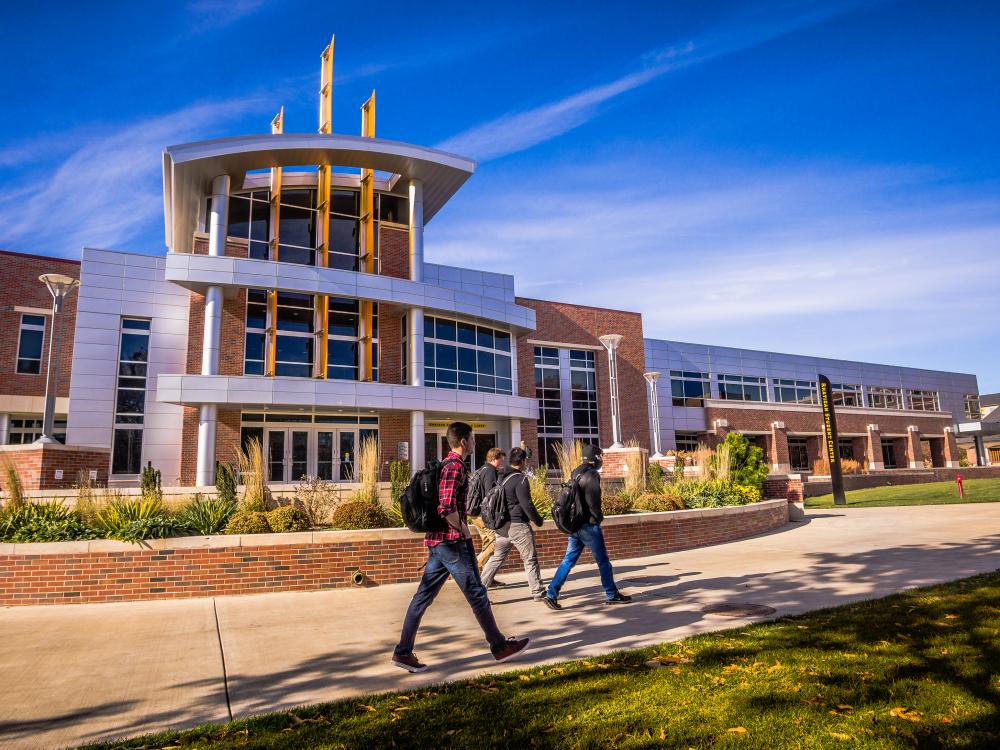Further Information
Application Procedure and Certificate Requirements
Interested students must apply through the Graduate School and meet their admissions
requirements. Current graduate students of WSU should complete the Declaration of Intent to Pursue a Graduate Certificate form through the . The admission review faculty may request any of the listed admission requirements
before rendering an admission decision. Students enrolled in the 12-hour certificate
program will be required to take a variety of coursework within the English discipline
with emphasis placed on coursework appropriate to high school educators. No more than
1/3 of these classes will be S/U graded. A cumulative graduate grade point average
of at least 3.00 for all courses comprising the certificate program will be expected
with no grades below C. Transfer hours will not be accepted for this certificate program. Students may use
certificate coursework toward an eventual degree. See below for the certificate's
admissions process and plan of study.
Admissions
To be considered for admission to the program, applicants must meet the following:
- A bachelor's degree from a regionally accredited institution;
- A grade point average of at least 2.750 based upon the last 60 credit hours of coursework
(or nearest semester or term break to this), including any postbachelor's graduate
work. Students who do not meet the 2.750 grade point average requirement may be admitted
to this category on probation if reasonable evidence exists to indicate their ability
to perform satisfactorily in 800-level or above coursework.
- Applicants who have an earned degree from institutions in countries in which English
is not the native language must meet one of the follow before being admitted into
the program: minimum 100 iBT or equivalent TOEFL score, overall 7.5 IELTS band score,
or a 73 on the PTE-Academic.
Plan of Study
Required Courses (3 hours, choose one)
Engl 534: Young Adult Literature
Engl 565: Multimodal Composition
Engl 576: Advanced Studies in the Graphic Novel
Engl 580: Special Studies
Engl 680: Theory and Practice in Composition
Engl 700: Introduction to Graduate Studies
Electives (9 hours) to be chosen in consultation with the certificate coordinator in the area of pedagogical
studies, rhetoric and composition, literary studies, and/or linguistics.
Sample Online Course Descriptions
Advanced Studies in Graphic Novels (Engl 576)
Students pursue an in-depth study of the graphic novel with special emphasis on critical
responses. The course is designed to help students recognize aesthetic, social, metaphorical,
and philosophical meanings/themes in graphic novels and to critically analyze these
texts. Readings could include Frank Miller, Klaus Janson, and Lynn Varley's The Dark Knight Returns, Alan Moore and David Lloyd's V for Vendetta, Chris Ware's Jimmy Corrigan: The Smartest Kid on Earth, among other graphic novels.
(In)dependent States: The Young Adult in Literature (Engl 534)
This class explores representations of childhood as depicted in popular young adult
novels published in the United States. The course opens with two early American texts,
Horatio Alger’s Ragged Dick and Louisa May Alcott’s Little Women, as an introduction to how shifting definitions of childhood contributed to the development
of YA literature as a genre. From there, we will turn our attention to more contemporary
representations of childhood, focusing on four coming-of-age stories: Lois Lowry’s
post-apocalyptic Gathering Blue (2000), Angie Thomas’s The Hate U Give (2017), Becky Albertalli’s Simon vs. the Homo Sapiens Agenda (2015), and Elizabeth Acevedo’s free verse novel The Poet X (2018). To help reveal the diversity of the interpretative approaches available to
scholars of YA literature, each work will be paired with a different disciplinary
lens, including disability studies, critical race theory, queer theory, and Latinx
studies.
Theory and Practice in Composition (Engl 680)
This course introduces students to theories of rhetoric and writing, major research
questions in the field of composition studies, and best practices for teaching writing
in schools and colleges. We will investigate writing processes, analyze varieties
and examples of student writing, and hone our own writing skills by drafting, revising,
and evaluating our own and others’ work. As we read significant publications in the
field, we will continually consider the relationship between theory and classroom
practice. Assignments will give you experience reading challenging pedagogical and
theoretical texts; posing complex and worthwhile questions about the teaching of writing;
performing research and synthesizing your findings; drafting course materials for
current or future writing classes; reading instructional texts critically; and responding
effectively to student writing. Topics of discussion will include using writing as
a reading strategy; teaching sentence structure and grammar; and responding to and
assessing student writing.
Monsters of the Nineteenth Century (Engl 527)
From Frankenstein's Monster to Dr. Jekyll/Mr. Hyde to Dracula, many of our most enduring
monsters emerged from nineteenth-century texts. This seminar examines these figures
and their twentieth-century counterparts through a range of theoretical lens, including
critical race and queer theory, in order to trace the evolution of the monstrous "other." Texts include The Vampyre (1816), Frankenstein (1818), Carmilla (1872), The Strange Case of Dr. Jekyll and Mr. Hyde (1886), The Beetle (1897), and Dracula (1897), as well as film adaptations like The Beetle (1919), Frankenstein (1931), and Dracula (1931).


